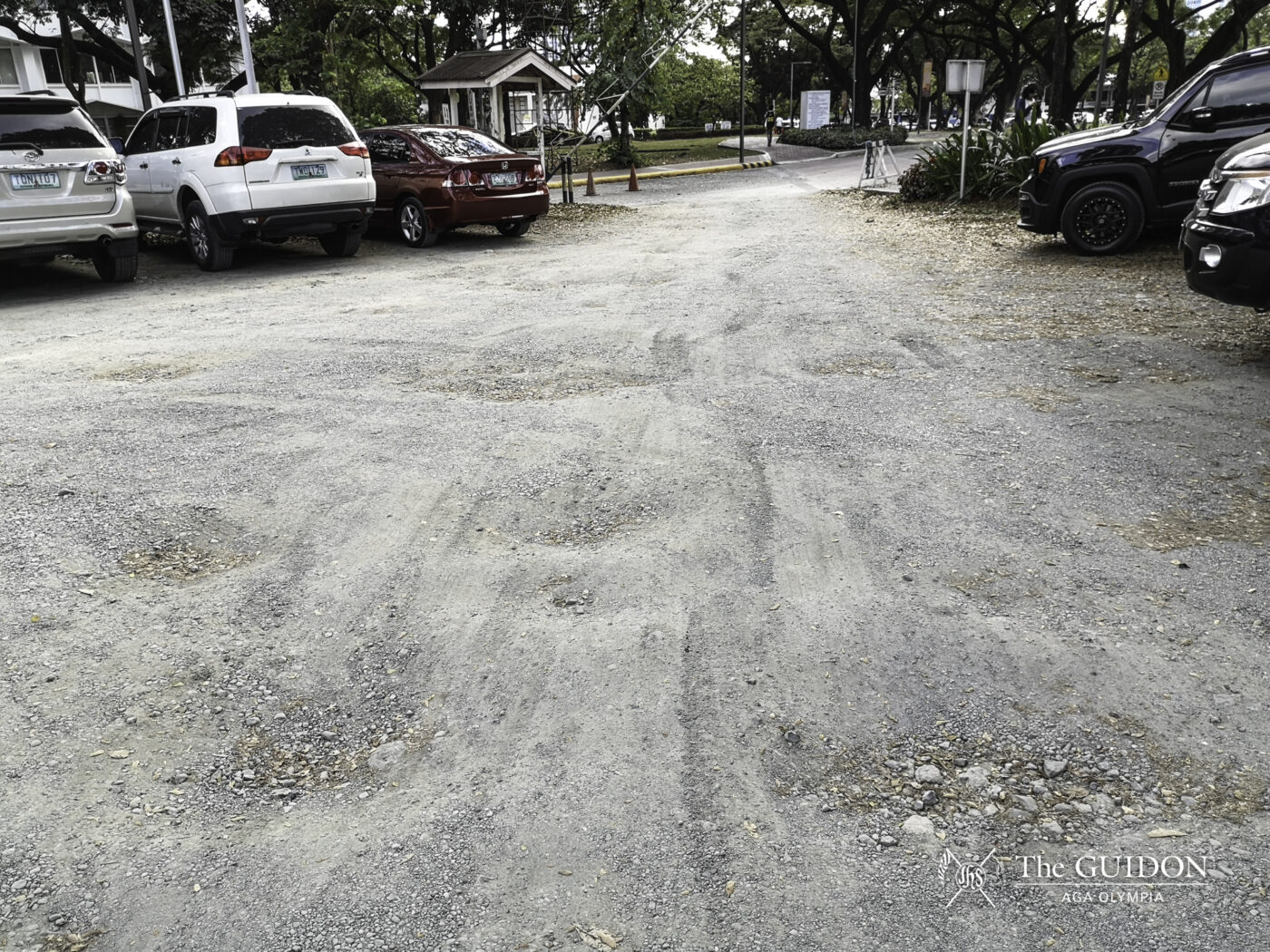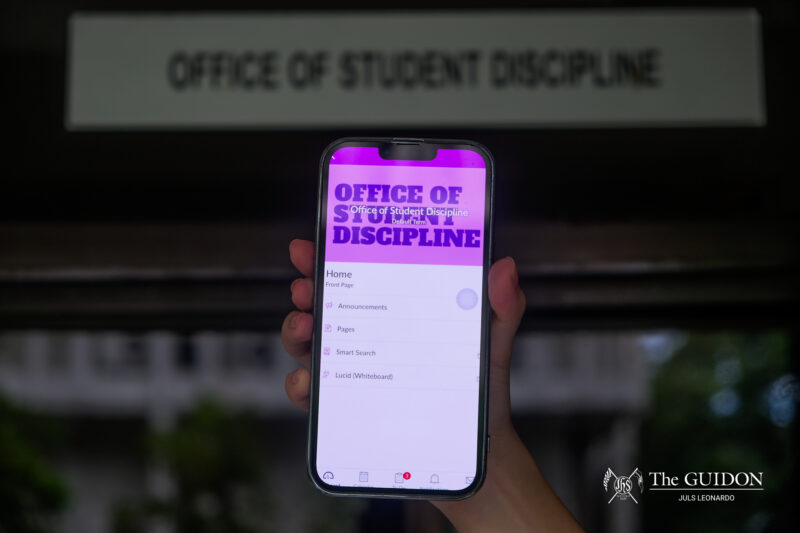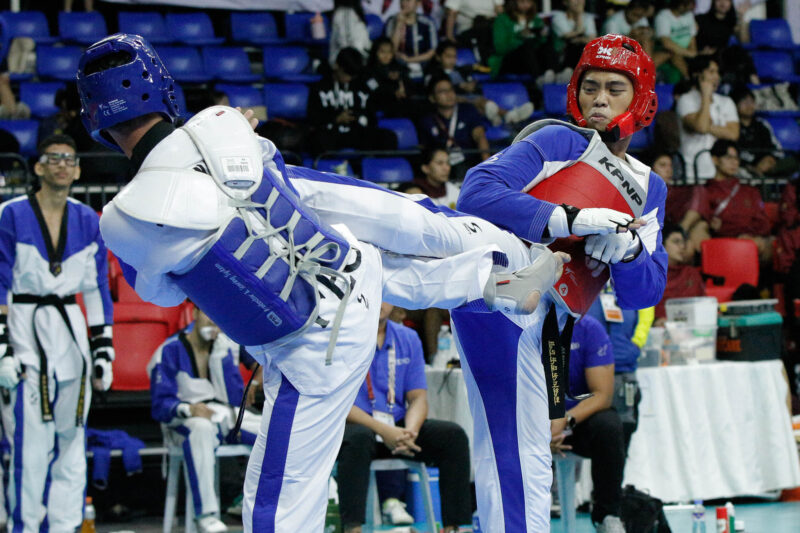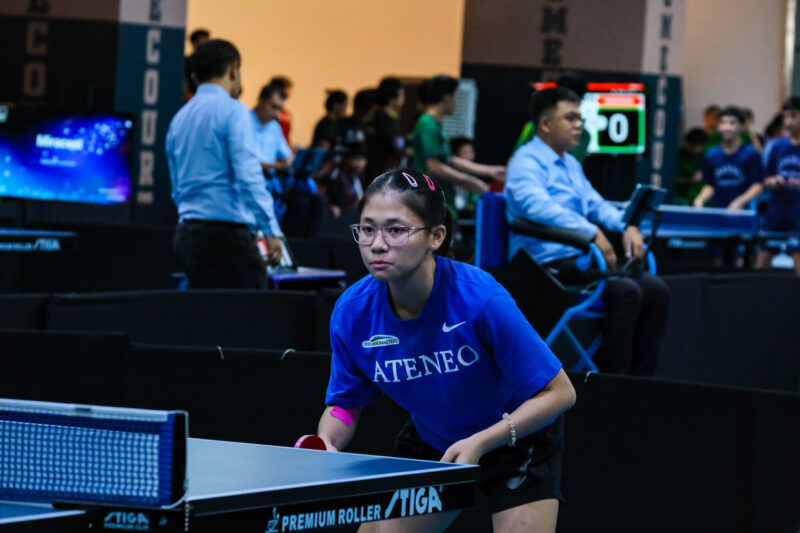VICE PRESIDENT for the Loyola Schools (VPLS) Maria Luz Vilches, PhD has forwarded a Sanggunian-coursed request to allocate more funding for the improvement of major campus facilities to the Major Improvements Subcommittee for school year 2019-202o.
Along with the VPLS, the Ateneo Head Administrators of the Major Improvements Subcommittee, Campus Safety and Mobility Office (CSMO), and Office of Management Information Systems (OMIS) have asserted that they have begun drawing plans to address the request.
A series of concerns on issues regarding the OBF Wi-Fi connection and the campus parking lots in the ADMU Freedom Wall Facebook page prompted Sanggunian’s request to improve campus facilities.
The proposal called for the improvement of some facilities, such as requests to install larger bricks in the Red Brick Road, renovate parking spaces and install more lamp posts within them, renovate the Covered Courts restrooms, and revamp the Ateneo Integrated Student Information System (AISIS).
The formal request also included the addition of new facilities, such as building of a pathway from Bellarmine Hall to Institute of Social Order (ISO), building a covered pathway from Berchman Hall to the Residence Halls, installation of water dispensers in the upper floors of CTC-SOM buildings and water audit of existing dispensers, and the installation of student pantries near Gonzaga Hall and the JGSOM Student Enterprise Center (JSEC).
Call for improvement
In writing the letter, Sanggunian President Hya Bendaña said focus was placed on issues that are most pressing and relevant to the student body. She recognized the OBF Wi-Fi to be the one of the most important concerns, especially to scholars who do not have wi-fi access at home.
“[I feel that] regardless of your social class in the Ateneo, wi-fi is really a big concern and necessity for you to go about your day-to-day needs,” she said.
“Not to [mention] we spend a lot of money into ensuring that wi-fi connection is stable. It’s a disservice [if the] wi-fi connection [is unstable,] especially if there are still means to improve it,” she added.
Along with wi-fi, parking areas are also an issue among students. Bendaña stated that high possibility of slipping in parking lots due to the uneven ground.
“We think that if the administration could spend a lot of money making parking near [the Science Education Complex (SEC)], Red Brick Road, then maybe they can also renovate the parking spaces into asphalt and cement,” she said.
Admin’s response
Head of the Major Improvements Subcommittee Luis Dumlao, PhD said that the budget deliberations taking place now are set to be implemented for next school year 2019-2020.
When it comes to budget approval, he explained that the deliberation on whether or not to allocate more funding into a certain campus facility depends on its sustainability (50%), functionality (40%), and aesthetics (10%).
Regarding complications that may arise when addressing the requests, Dumlao stated that the initial requested budget of Php 50 million proposed by the Sanggunian for the Major Improvements Subcommittee was costly and unaffordable.
“We have to be resourceful and innovative of how to get into the budget,” he said. The initial requested budget has since been cut down to Php 35 million.
Meanwhile, CSMO Director Marcelino Mendoza said their office is in motion towards addressing concerns about parking and mobility.
“We plan to improve [the parking lots] by regravelling the parking area, and subdividing it with a marking that [would] be well-seen by the drivers,” he said.
Mendoza also elaborated on further plans, including the implementation of the radio-frequency identification (RFID) system in order to address concerns about parking management.
“We want to limit the parking areas to those who carpool [and those who have an] RFID ID card. When you tap [your identification card], the card reader will reflect if you are authorized to park there or not,” he said.
Mendoza clarified that the while the CSMO is currently improving the parking system, the number of parking slots will not necessarily increase due to the “limited” parking infrastructure.
Addressing wi-fi concerns
For OMIS Director James Gregorio, determining what areas to prioritize is the next step for the OBF Wi-Fi. He said that the problem of instability and coverage area is rooted in the lack of number of access points.
He explained that one access point can only serve a limited number of people in the area.
“If the [access point] can only serve 150 people, [but] there are 200 people [in that area], there’s going to be a problem. Access points are like routers you have at home. Here in Ateneo, the routers are high-end [since it’s] for commercial purposes. It’s quite expensive,” he said.
Gregorio also clarified that students should not expect wi-fi coverage for the entire Loyola Schools area space anytime soon.
“What we projected here [is] the proposal was to give wi-fi to classrooms, not the tambayan [areas]. That’s going to be too expensive,” he said.
“As of now, we made up a proposal prioritizing classrooms that are heavily utilized, and also taking note [if the] building is already cabled,” Gregorio added. These prioritized buildings include the PLDT Convergent Technologies Center (PLDT-CTC), the John Gokongwei School of Management (JGSOM), and the Manuel V. Panilingan Center for Student Leadership (MVP-CSL) building.
Gregorio also stated that wi-fi improvement will be carried out in two phases, which will span two years if started by June.
“If it’s approved, then the budget will come out some time June of [2019]. That’s the only time we can actually start doing something and [make] the students feel the improvements [of the] wi-fi,” he said.
The proper avenue for concerns
Although several complaints have been voiced out on the ADMU Freedom Wall page, Bendaña noted that using it as an avenue to raise issues may be less effective than directly messaging the Sanggunian. This is because concerns are not forwarded to proper authorities if left on social media.
“[The Ateneo administration is not] proactive about [these complaints] because they don’t know what our concerns are. That’s why it’s necessary for us to draft a letter detailing what we need. We can’t just complain on wi-fi [and] parking without channeling it to the right people to act on the issue,” she said.
Should students have further complaints, Bendaña expressed that the Sanggunian’s social media accounts are available to contact.
“If anything, I think it’s important to highlight the importance of the coordination between the student government and the administration,” she said.







